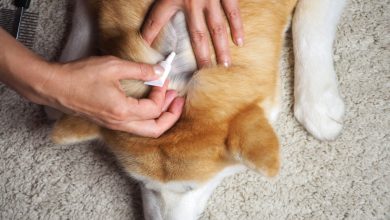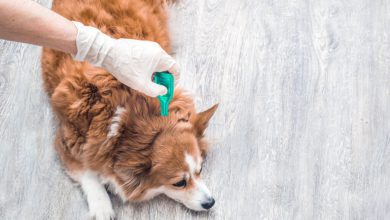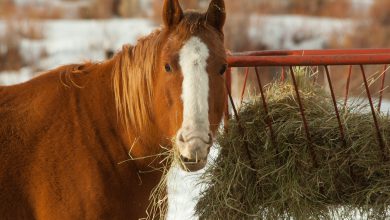What You Need To Know iHeartCats.com

With news of COVID-19 dominating world headlines, questions about this novel coronavirus are flooding the internet. And cat lovers worldwide have many when it comes to concerns over cats and coronavirus. But the first thing to remember is a spot of good news.
COVID-19 doesn’t seem to be infecting cats.
It’s true not a lot is known about COVID-19. But scientists and researchers are working diligently to learn all they can. So, keep calm, wash your hands, practice social distancing, and stay home with your cat if you can or have been ordered too.
Read on to find the answers to your most common questions about cats and coronavirus.

Cats and Coronavirus, Your Top Questions
What is a coronavirus?
Let’s remember the term coronavirus is not specific to COVID-19. The World Organisation for Animal Health explains, “Coronaviruses (CoV) are a family of RNA (ribonucleic acid) viruses. They are called coronaviruses because the virus particle exhibits a characteristic ‘corona’ (crown) of spike proteins around its lipid envelope.”
But where did this specific coronavirus, COVID-19, come from?
The OIE states, “Current evidence suggests that the COVID-19 virus has an animal source. Ongoing investigations are important for identifying the animal source (including species involved) and establishing the potential role of an animal reservoir in this disease. Yet, to date, there is not enough scientific evidence to identify that source or to explain the route of transmission from an animal source to humans.”

When researchers began their study of COVID-19, the genetic sequence data of COVID-19 was discovered to be “a close relative of other CoV found circulating in Rhinolophus bat (Horseshoe Bat) populations.”
And while its true COVID-19 probably first began with an animal host infecting a human, COVID-19 seems to be keeping with a human-to-human spread.
COVID-19 is a new illness and cat lovers can’t help worry over cats and coronavirus. We don’t know everything there is to know yet, but scientists across the globe are hard at work learning about this novel coronavirus.
“There is no evidence that dogs [or cats] play a role in the spread of this human disease or that they become sick. Further studies are needed to understand if and how different animals could be affected by COVID-19 virus,” says the OIE.
Can COVID-19 infect cats?
There isn’t a clear-cut answer to this question yet, but the case of the “weak-positive” Pomeranian in Hong Kong suggests it’s possible.
The Hong Kong Agriculture, Fisheries and Conservation Department said experts agreed the Pomeranian had “a low-level of infection and it is likely to be a case of human-to-animal transmission.”
Though testing positive, the elderly dog remained asymptotic and returned home after a 2-week quarantine period. However, it’s been learned the 17-year-old Pomeranian has recently passed away and “animal welfare experts have suggested that dog’s death could have been caused by the stress of being quarantined and separated from its owner.”
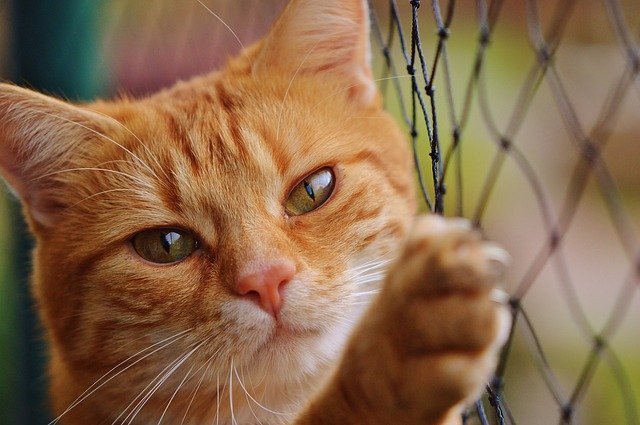
As of now, the U.S. Center for Disease Control “has not received any reports of pets or other animals becoming sick with COVID-19.”
Dr. Zac Pilossoph, DVM, suggests the dog might have been a passive carrier, which means, “a passive carrier is a living creature that can help spread disease from one animal to another, without ever becoming infected themselves.”
But the World Health Organization maintains, “While there has been one instance of a dog being infected in Hong Kong, to date, there is no evidence that a dog, cat or any pet can transmit COVID-19. COVID-19 is mainly spread through droplets produced when an infected person coughs, sneezes, or speaks.”
When worrying for your cat, remember…. Though coronavirus infections occur in both humans and animals, not many of these viral infections can cross between us and our furry pals. So far, COVID-19, known scientifically as SARS-Cov-2, is only sickening humans.
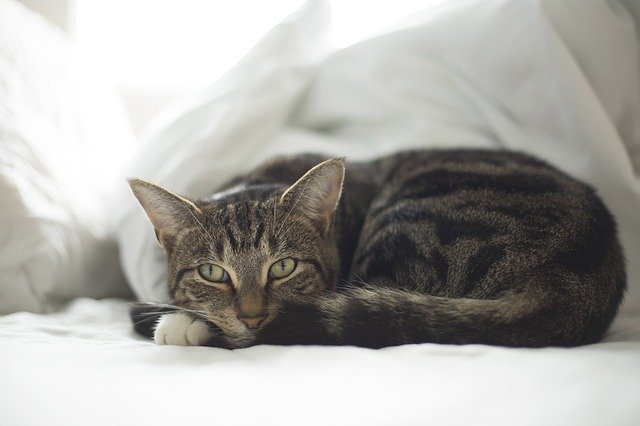
More FAQs Regarding Cats and COVID-19
Can my cat spread COVID-19 to me?
The CDC reports, “At this time, there is no evidence that companion animals including pets can spread COVID-19. However, since animals can spread other diseases to people, it’s always a good idea to wash your hands after being around animals.”
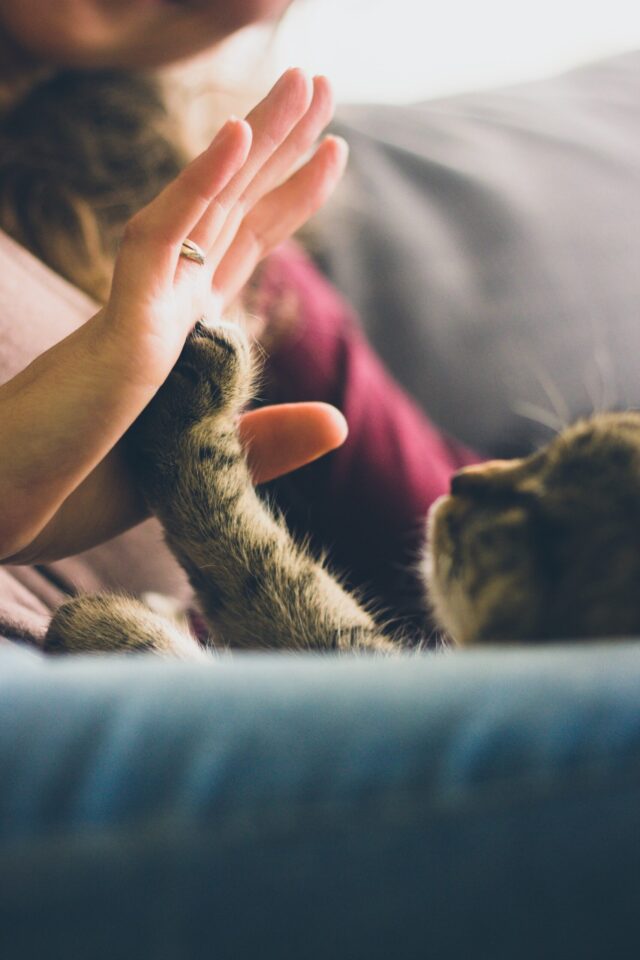
This is a confusing topic as reports tell us COVID-19 has beginnings in an animal host. Like COVID-19, past coronavirus infections SARS and MERS began from animal sources. But once these viruses made the initial leap to humans, the infections kept within the human populous.
“Detailed investigations have demonstrated that SARS-CoV was transmitted from civets to humans, and MERS-CoV from dromedary camels to humans,” says the OIE.
There is still a lot unknown about COVID-19. Stay tuned to news sources for further information about cats and COVID-19.
Should I avoid contact with my cat or other animals if I am diagnosed with COVID-19?
If you are sick with COVID-19, avoid contact with cats and other animals. While there is no evidence to support cats getting sick with this novel coronavirus, it remains a good idea to avoid contact with cats, other animals, and other people if ill.
While diagnosed individuals remain “symptomatic, they should maintain separation from pets as they would with other household members, and avoid direct contact with pets, including petting, snuggling, being kissed or licked, and sharing food,” according to the CDC.
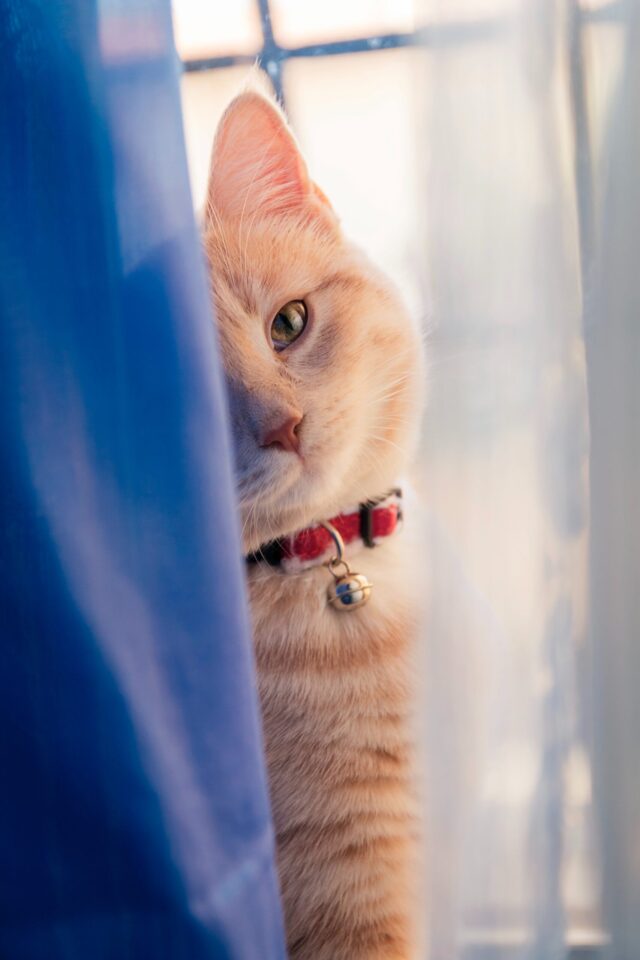
The CDC also advises, “Although there have not been reports of pets or other animals becoming sick with COVID-19, it is still recommended that people sick with COVID-19 limit contact with animals until more information is known about the virus.”
If you can’t get a family member to care for the fur babies while your isolating, then wear a mask and gloves while interacting with your cat. It’s better to be safe than sorry when it comes to cat health.
What supplies should I have on-hand for my cat?
As you stock up on supplies for you and your family, don’t forget the furry family members. Be sure to have enough food and litter on hand for 2 – 4 weeks. If your cat takes medicine, be sure you purchase a month-long supply of those too. Don’t let your cat run out of life-saving prescriptions!
Also, keep identification tags and vet records handy. Having a cat carrier at the ready is also a good idea. VeterinaryPracticeNews.com suggests having these items, along with food and medicines, already prepared in case you get sick and you need them readily available for your cat’s caretaker.
Should I bathe my cat to help avoid COVID-19?
We’ve recently learned “the virus that causes coronavirus disease 2019 (COVID-19) is stable for several hours to days in aerosols and on surfaces,” according to the National Institutes of Health. So, if your cat has come in contact with someone infected by COVID-19, then a bath might be a good idea to protect the both of you.

To avoid having to bathe a cat who doesn’t like baths, restrict visitors in your home.
Can I take my cat to the vet?
Postpone wellness visits for annual vaccinations and workups until the threat from COVID-19 subsides. The less you leave your home, the lower your risk of contracting COVID-19. But, if your cat is experiencing a medical emergency, then contact your vet and proceed with their instruction.
What if my cat has COVID-19 symptoms?
Contact your vet in you suspect any illness in your cat.
When it comes to COVID-19 testing for dogs and cats, the American Veterinary Medicine Association reports, “currently there is no clinical testing available as of today (3/12/2020) in the United States, but tests and testing capacity are being developed.”
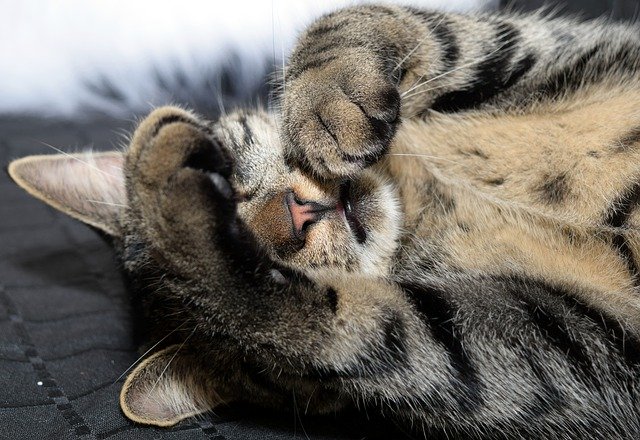
Science tells us cats and COVID-19 don’t go together. But, as cat parents know, it’s hard to quell fear when our kitty dears get sick. If your cat has symptoms that resemble those of COVID-19, don’t panic. Call your vet. There are more likely explanations for your cat’s cold symptoms.
Keep Your Cat Safe While You’re Disinfecting Your Home
In this time of deep cleaning and disinfecting, be sure to keep your cats safe from harmful chemicals. And while you’re cleaning like crazy, be sure to wash food and water bowls. Disinfect beds and blankets as well. Be sure to keep everyone safe and healthy by keeping chemicals out of cat paws.
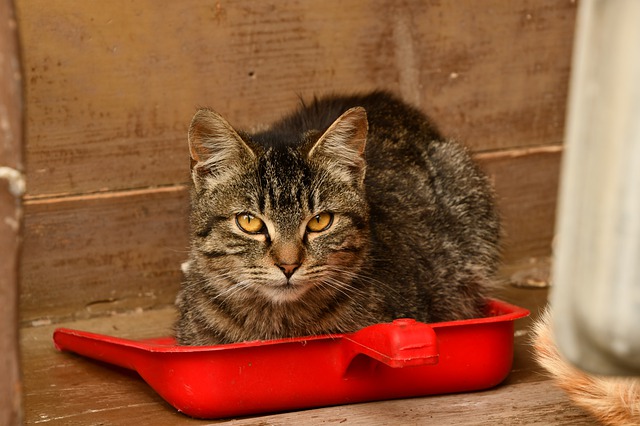
If a poison emergency does arise, contact ASPCA’s Animal Poison Control.
ASPCA Animal Poison Control Center Phone Number: (888) 426-4435
Getting Through Trying Times with Your Cat Bestie at Your Side
We may be stuck at home for a while, but there is a bright side. Your cat! Pass the hours with lots of fun stuff you and your cat can do together!

And please remember this above all else…never abandon your cat! In these times of uncertainty, our cats need us more than ever. Keep you and your furry ones safe by heeding quarantine notices and government mandates. Also know, you’re not alone. We’re all in this together.

